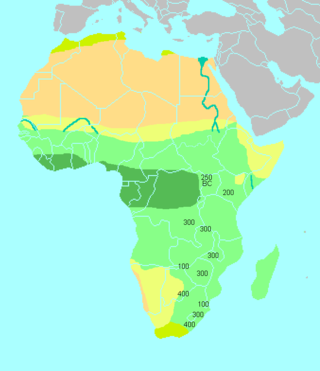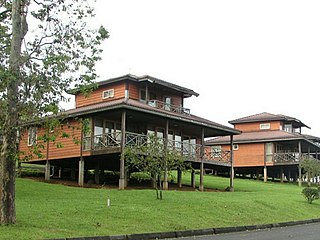Related Research Articles

Niger–Congo is a hypothetical language family spoken over the majority of sub-Saharan Africa. It unites the Mande languages, the Atlantic-Congo languages, and possibly several smaller groups of languages that are difficult to classify. If valid, Niger-Congo would be the world's largest in terms of member languages, the third-largest in terms of speakers, and Africa's largest in terms of geographical area. It is generally considered to be the world's largest language family in terms of the number of distinct languages, just ahead of Austronesian, although this is complicated by the ambiguity about what constitutes a distinct language; the number of named Niger–Congo languages listed by Ethnologue is 1,540.

The Bantu expansion is a hypothesis about the history of the major series of migrations of the original Proto-Bantu-speaking group, which spread from an original nucleus around Central Africa across much of sub-Saharan Africa. In the process, the Proto-Bantu-speaking settlers displaced, eliminated or absorbed pre-existing hunter-gatherer and pastoralist groups that they encountered.

Benue–Congo is a major branch of the Volta-Congo languages which covers most of Sub-Saharan Africa.

Cross River State is a state in the South-South geopolitical zone of Nigeria. Named for the Cross River, the state was formed from the eastern part of the Eastern Region on 27 May 1967. Its capital is Calabar, it borders to the north through Benue state, to the west through Ebonyi state and Abia state, and to the southwest through Akwa Ibom state, while its eastern border forms part of the national border with Cameroon. Originally known as the South-Eastern State before being renamed in 1976, Cross River state formerly included the area that is now Akwa Ibom state, which became a distinct state in 1987.

Calabar is the capital city of Cross River State, Nigeria. It was originally named Akwa Akpa, in the Efik language. The city is adjacent to the Calabar and Great Kwa rivers and creeks of the Cross River.
Tiv is a Tivoid language spoken in some states in North Central Nigeria, with some speakers in Cameroon. It had over 5 million speakers in 2020. The largest population of Tiv speakers are found in Benue state in Nigeria. The language is also widely spoken in the Nigerian states of Plateau, Taraba, Nasarawa, Cross River, Adamawa, Kaduna, and Abuja. It is by far the largest of the Tivoid languages, a group of languages belonging to the Southern Bantoid languages

Tiv are a Tivoid ethnic group. They constitute approximately 2.4% of Nigeria's total population, and number over 5 million individuals throughout Nigeria and Cameroon. The Tiv language is spoken by about 5 million people in Nigeria with a few speakers in Cameroon. Most of the language's Nigerian speakers are found in Benue, Taraba, Nasarawa, Plateau, Cross rivers, Adamawa, Kaduna, and Abuja States. The language is a branch of Benue–Congo and ultimately of the Niger–Congo phylum. In pre-colonial times, the Fulani ethnic group referred to the Tiv as "Munchi", a term not accepted by Tiv people. They depend on agricultural produce for commerce and sustenance.

Obudu is a local government area and town in Cross River State, Nigeria. The area features a tourist resort, Obudu Mountain Resort, which hosts an annual mountain running competition called the Obudu Ranch International Mountain Race. The town of Obudu is downstream from the Obudu Dam, which has caused acute scarcity of drinking water in the dry season. The town is approximately 17 kilometers away from Bebi Airport and is a 6-hour drive from Calabar, the capital of Cross River.

There are over 525 native languages spoken in Nigeria. The official language and most widely spoken lingua franca is English, which was the language of Colonial Nigeria. Nigerian Pidgin – an English-based creole – is spoken by 30 million people in Nigeria.

The Yakurr live in five compact towns in Cross River State, Nigeria. They were formally known as Umor, Ekoli, Ilomi, Nkoibolokom and Yakurr be Ibe. Due to linguistic problems encountered by the early European visitors, the settlements have come to be known by their mispronounced versions – Ugep, Ekori, Idomi, Nko and Mkpani. In the latter, it is a product of yakpanikpani, a name, which Enang (1980) says was given to them by the Ugep people after being tricked in a conflict.

Tourism in Nigeria centers largely on events, due to the country's ample amount of ethnic groups, but also includes rain forests, savannah, waterfalls, and other natural attractions. Tourists spent US$2.6 billion in Nigeria in 2015. This dropped to US$1.5 billion in 2017, probably due to the rise of the Boko Haram insurgency of 2015.
Boki is a Local Government Area in the Cross River State of Nigeria. It was created on 28 August 1991, and its capital is Boje. The region has a contiguous border with the Republic of Cameroon and is known internationally as a commercial centre for agricultural commodities such as cocoa, coffee, timber, and palm products.

Obanliku is a Local Government Area of Cross River State, Nigeria. Its headquarter is in the town of Sankwala. Obanliku is made up of ten wards namely: Busi, Basang, Bebi, Bisu, Utanga, Becheve, Bendi 1, Bendi 2, Bishiri North & Bishiri South. Obanliku Local Government is located in the Northern Senatorial District of Cross River State. It is both an inter-State and international boundary Local Government Area. It is bounded in the North by Kwanda Local Government of Benue State in the East by the Republic of Cameroon, the west by Obudu Local Government Area and in the South by Boki Local Government Area.

The Bendi languages are a small group of languages spoken in Cross River State, southeastern Nigeria. Bokyi is one of the Bendi languages having some speakers in Cameroon. Once counted among the Cross River languages, they may be a branch of Southern Bantoid, with observed similarities especially with the Ekoid languages.
Obudu Plateau is a plateau found on the Oshie Ridge of the Sankwala Mountain range, in Cross River State, in the southeast of Nigeria. The plateau is found in Obanliku local government area of the Cross River State. The plateau extends towards Nigeria's south eastern border. The Obudu Plateau is spread over an area of over 40 square miles (100 km2) and rises to about 5,200 ft above sea level. The plateau is a giant massif in its own right, and its peak reaches a height of about 1,716 metres (5,630 ft) above sea level. The plateau is a habitat of rare species of birds.
The Sankwala Mountains are a mountain range in Obanliku Local Government Area of Cross River State in Nigeria. The Sankwala Mountains lie southeast of the town of Obudu, north of the Okwangwo section of Cross River National Park. The mountains attain an average elevation of about 1,800 metres (5,906 ft) above sea level.

Obudu Mountain Resort is a ranch and resort on the Obudu Plateau in Cross River State, Nigeria.

Gembu is a town on the Mambilla Plateau in Taraba State of Nigeria. It is the headquarters of Sardauna Local Government Area in Taraba State.

Benedict Bengiuoshuye Ayade is a Nigerian politician who has been serving as the governor of Cross River State since 2015, having previously served as Senator for Cross River North from 2011 to 2015.
References
- ↑ Ashipu, KBC. “A Socio-Stylistic Analysis of Some Selected Bette Dirges.” Lwati: A Journal of Contemporary Research, vol. 7, no. 2, 2010, doi:https://dx.doi.org/10.4314/lwati.v7i2.57538.
- ↑ Middleton, John; Tait, David (2013-11-05). Tribes Without Rulers: Studies in African Segmentary Systems. Routledge. pp. 33–. ISBN 9781136532139 . Retrieved 5 December 2017.
- ↑ Ishi, Ukemiteh. "Obudu New Yam Festival: The People, Their Tradition". Cross River Watch Web. 31 August 2017. 4 December 2017